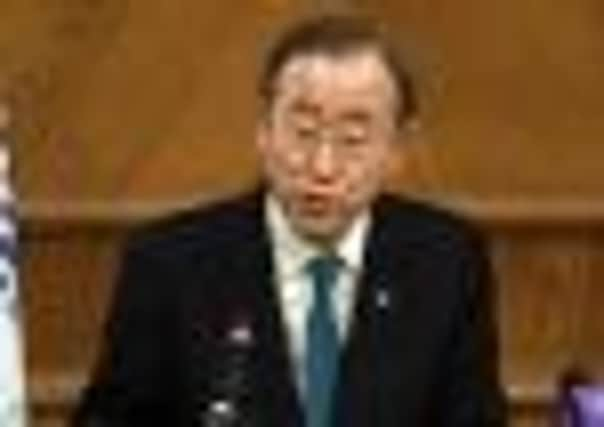West and Arabs lobby Russia to end UN deadlock on Syria


UK Foreign Secretary William Hague joined US Secretary of State Hillary Clinton and French foreign minister Alain Juppe for the afternoon Security Council session on Syria. Nabil Elaraby, the chief of the Arab League, and Sheikh Hamad Bin Jassem Bin Jabr Al Thani, Qatar’s prime minister, also briefed Security Council members.
Russia, a veto-wielding permanent member of the council, has objected to the draft, which is backed by western and most Arab powers. Russia’s deputy foreign minister Gennady Gatilov yesterday said the resolution was a “path to civil war.”
Advertisement
Hide AdAdvertisement
Hide AdRussia said it feared the new measure could lead to military action and regime change, just as an Arab-backed UN resolution led to Nato airstrikes in Libya.
Backers of the draft point out that it says specifically that “nothing… compels states to resort to the use of force or the threat of force”.
An actual vote on the draft resolution is unlikely until later this week.
The UN estimates more than 5,400 people have been killed since last March in the Syrian government crackdown against protesters.
The draft resolution demands Mr Assad halt the crackdown and implement an Arab League peace plan calling for him to hand over power to his vice-president. If he fails to comply within 15 days, the council would consider “further measures,” a reference to a possible move to impose sanctions.
UN Secretary-General Ban Ki-moon said at a news conference in Amman, Jordan, that he was “encouraged by the League of Arab States’ initiative to seek a political solution” to the crisis.
“It is more urgent than ever to put an end to this bloodshed and violence, to start a credible political solution that addresses the legitimate aspiration of the Syrian people and to protect their fundamental freedoms,” Mr Ban said.
If Russia chooses to use its veto, there isn’t much more council members can do except draft a non-binding statement that would have to be approved by consensus.
Advertisement
Hide AdAdvertisement
Hide AdIn October, a Western-backed resolution condemning the violence in Syria was blocked by a double veto of Russia and fellow permanent member China.
Syria has been Moscow’s top ally in the Middle East since Soviet times, when it was led by Mr Assad’s father, Hafez. The Kremlin saw it as a bulwark for countering Western influence in the region.
While Russia’s relations with Israel have improved greatly since the Soviet collapse, ties with Damascus helped Russia retain its clout as a member of the Quartet of international mediators trying to negotiate peace between Israel and the Palestinians.
For decades, Syria has been a major customer for Russian arms, buying billions of pounds worth of combat jets, missiles, tanks and other heavy weapons.
Hillel Neuer, executive director of the Geneva-based monitoring group UN Watch, said it was time for Russia to end “its increasingly futile effort to shield the doomed Assad regime.
“Russia would do better to prepare the dictator’s Moscow asylum, something he will need sooner rather than later,” he said.
The uprising against Mr Assad – one of the most violent revolts of the Arab spring – has entered a new phase in recent weeks, with an insurgency whose leadership is based in Turkey daring to show its face on the outskirts of Damascus.
This has prompted a violent reaction from the regime, which has spend the past few days involved in heavy fighting with rebels in the suburbs to the east of the capital.